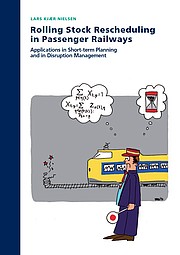Rolling Stock Rescheduling in Passenger Railways Defended on Friday, 11 February 2011
Modern society is highly dependent on a reliable railway system for workforce mobility and easy access to the cities. However, the daily operations of a large passenger railway system are subject to unexpected disruptions such as rolling stock breakdowns or malfunctioning infrastructure. In a disrupted situation, the railway operator must adapt the timetable, rolling stock and crew to the modified conditions. This adaptation of resource allocations requires the solution of complex combinatorial problems in very short time and thus represents a major challenge for the involved dispatchers.
In this thesis we develop models and solution methods for the rescheduling of the rolling stock during disruptions. The models incorporate service aspects (such as seat capacity), efficiency aspects (such as number of kilometers driven by the rolling stock), and process related aspects (such as the need for night-time relocation of rolling stock).
The thesis contains applications of the developed models in three different contexts. First, we present a framework for applying the rescheduling models in the highly uncertain environment of railway disruption management, and we demonstrate the trade-off between computation time and solution quality. Second, we embed the rolling stock rescheduling models in a simulation framework to account for the dynamic passenger behavior during disruptions. This framework allows us to significantly decrease the delays experienced by passengers. Third, we apply the rescheduling models to real-life planning problems from the short-term planning department of the Netherlands Railways. The models lead to a considerable speed-up of the process and significant savings.
Keywords
railway, passenger, disruption management, rescheduling, operations research, optimization, rolling stock, decision support











